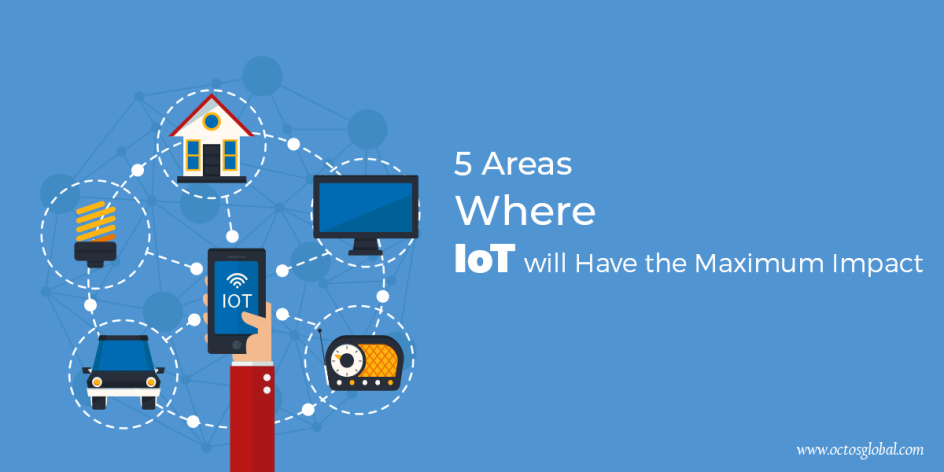Many business owners believe they can let go of a trend, because it is not relevant to their vertical. If you believe IoT applications are not a part of your industry, think again.
By 2025, there will be over 75 billion IoT connected devices globally. IDC has forecasted that IoT spending will touch $1.2 trillion by 2025. One thing is clear – IoT is not a trend; it is a tectonic shift in the way we interact with devices.
The last time businesses were ignoring a trend, they ended up becoming obsolete; and the ones who became obsolete were giants – Blackberry and Nokia, who ignored the trend of smartphones.
Still thinking where will IoT create the maximum impact? Here are the 5 key areas that will get heavily impacted by IoT:
1. Household Goods: The biggest change that is expected will be in the way consumers interact with the very basic electronic devices in their very homes.Alexa and Google Home have already created the demand for a virtual assistant. There are already lights, fans and ACs that can be controlled with voice commands. We already have smart fridges rolled out. The next wave of evolution will come in the form of automation.
The biggest change that Internet of Things applications will bring are hordes of data. Business can now monitor the micro level data on how are users interacting with their devices and smart devices which can share and update themselves will be able to provide more tailored experiences for the users.
2. Security: There is a common phrase in soccer – A team is as good as its weakest player. The exact though process applies to security.Security as an industry has seen a good amount of innovation in the recent years. That said, there has always been some space for errors in the system and more often than not, these errors belong to one category – the human errors.
We all make honest mistakes but even the smallest of errors can cause security breaches. Look at Facebook and Google, companies which have spent billions of dollars into security and are still facing data breaches.
IoT application development that allows machines to interact, share data and adapt as per the required changes in situations will make networks that are not only secure but also ready for new challenges that hackers pose.
3. Retail Commerce: One of the biggest waves of innovation will hit retail commerce. Yes, there are business pundits telling that retail will be dead in some years – but they are the same people who predicted the man will be living on the moon by the end of this decade.Retail will exist in the long run because there are certain products which need the physical touch and inspection before they are bought. No one is saying retail will exist in its current form; it will evolve and adapt.
IoT application design that helps retailers provide a more wholesome experience to the consumers will change the face of retail. Think about automated storage systems that are able to replenish the goods based on the demand forecasts or the bill-less retail environment where customers do not have to stand in ques to pay their bills and instead pay by getting their QR codes scanned in the alley where they picked the product itself.
4. Enterprise Technology: Enterprise technology is a broad term that usually entails CRM and ERP systems used by giant organizations to maintain a track of resources and projects.IoT will give these organizations a great boost because now they can reduce the possibility of human error in data gathering and handling. Imagine this – a warehouse which is able to keep all the storage units working and adapts to the changes in the demand curve, because it is connected in real time with the point of sales software the company has adapted. Geo tagging, delivery systems and inventory replenishment are areas which have already started adapting IoT.
5. Construction, Oil and Other Heavy Industries: Practically any industry that includes heavy machinery and runs on a high risk of systemic failure, will have to adapt to IoT. The bigger the operation is, the more data it will generate. The more data it generates, the greater it provides a possibility to automate the repeatable processes which help in cost cutting.In Conclusion
If you have a business that includes a lot of machinery and complex processes, some of which are recurring in nature – IoT will help you tremendously become a more agile and efficient organization. IoT is a simple system that helps your machines take the mundane operational decisions themselves, based on the data.

